新概念第二册第33-34课
- 格式:pdf
- 大小:425.79 KB
- 文档页数:7
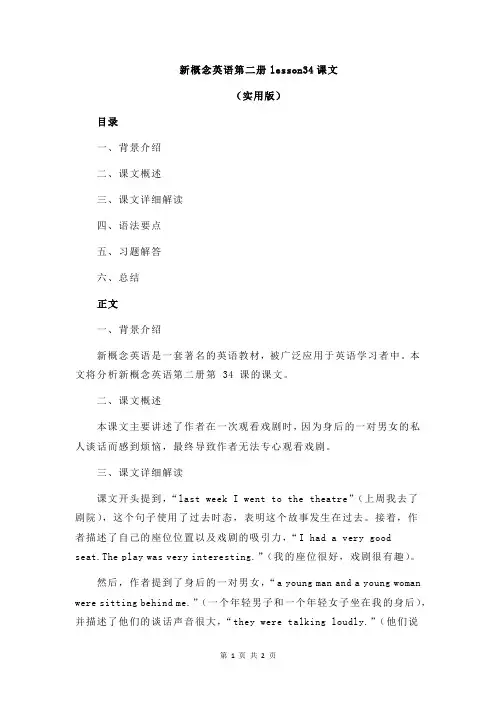
新概念英语第二册lesson34课文(实用版)目录一、背景介绍二、课文概述三、课文详细解读四、语法要点五、习题解答六、总结正文一、背景介绍新概念英语是一套著名的英语教材,被广泛应用于英语学习者中。
本文将分析新概念英语第二册第 34 课的课文。
二、课文概述本课文主要讲述了作者在一次观看戏剧时,因为身后的一对男女的私人谈话而感到烦恼,最终导致作者无法专心观看戏剧。
三、课文详细解读课文开头提到,“last week I went to the theatre”(上周我去了剧院),这个句子使用了过去时态,表明这个故事发生在过去。
接着,作者描述了自己的座位位置以及戏剧的吸引力,“I had a very goodseat.The play was very interesting.”(我的座位很好,戏剧很有趣)。
然后,作者提到了身后的一对男女,“a young man and a young woman were sitting behind me.”(一个年轻男子和一个年轻女子坐在我的身后),并描述了他们的谈话声音很大,“they were talking loudly.”(他们说话声音很大)。
因为这对男女的私人谈话,作者感到非常烦恼,“I was very angry.I couldn"t hear a word!”(我非常生气,一个字都听不见!),并转身与他们理论,“I turned round.I looked at the man and the woman angrily.”(我转身,生气地看着那个男人和女人),但他们并没有注意到作者的反应,“they didn"t notice.”(他们没有注意到)。
最后,作者再次转身,又一次表达了自己的不满,“I turned round again.I said, "I can"t hear a word!"”(我再次转身,说:“我听不见一个字!”),并且这次说话更加生气,“This is a private conversation!”(这是私人间的谈话!)。
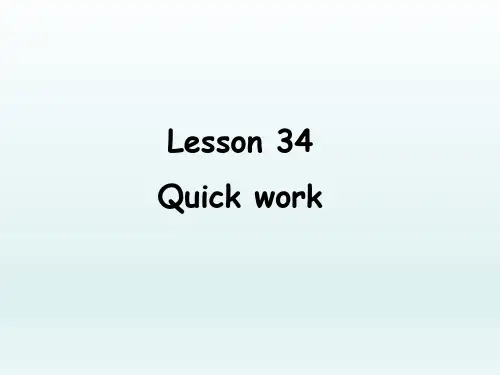
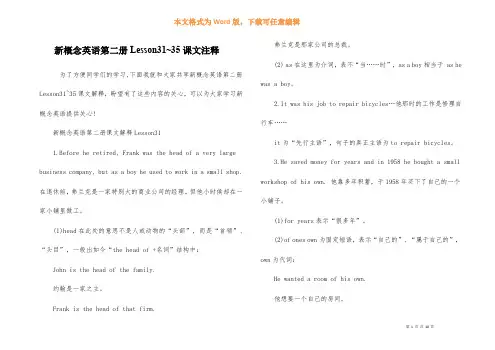
新概念英语第二册Lesson31~35课文注释为了方便同学们的学习,下面我就和大家共享新概念英语第二册Lesson31~35课文解释,盼望有了这些内容的关心,可以为大家学习新概念英语提供关心!新概念英语第二册课文解释Lesson311.Before he retired, Frank was the head of a very large business company, but as a boy he used to work in a small shop. 在退休前,弗兰克是一家特别大的商业公司的经理,但他小时侯却在一家小铺里做工。
(1)head在此处的意思不是人或动物的“头部”,而是“首领”、“头目”,一般出如今“the head of +名词”结构中:John is the head of the family.约翰是一家之主。
Frank is the head of that firm.弗兰克是那家公司的总裁。
(2) as在这里为介词,表不“当……时”,as a boy相当于 as he was a boy。
2.It was his job to repair bicycles…他那时的工作是修理自行车……it为“先行主语”,句子的真正主语为to repair bicycles。
3.He saved money for years and in 1958 he bought a small workshop of his own. 他靠多年积蓄,于1958年买下了自己的一个小铺子。
(1)for years表示“很多年”。
(2)of ones own为固定短语,表示“自己的”、“属于自己的”,own为代词:He wanted a room of his own.他想要一个自己的房间。
Do you have a house of your own?你有自己的房子吗?4.in ones twenties,(在某人)二十多岁的时候。
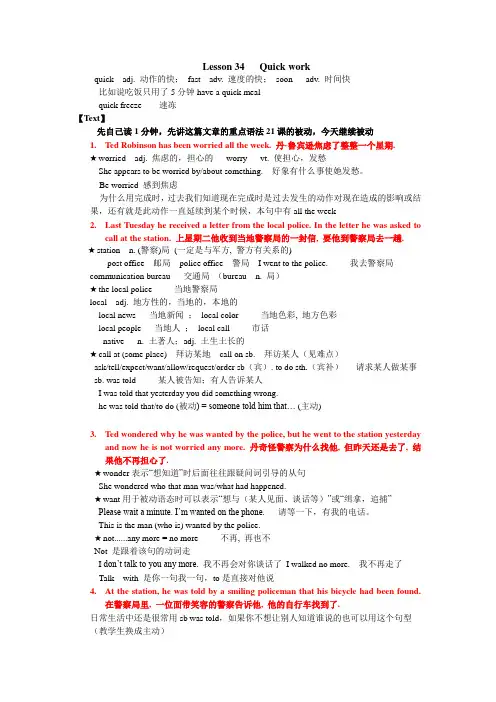
Lesson 34 Quick workquick adj. 动作的快;fast adv. 速度的快;soon adv. 时间快比如说吃饭只用了5分钟have a quick mealquick freeze 速冻【Text】先自己读1分钟,先讲这篇文章的重点语法21课的被动,今天继续被动1.Ted Robinson has been worried all the week. 丹·鲁宾逊焦虑了整整一个星期.★worried adj. 焦虑的,担心的worry vt. 使担心,发愁She appears to be worried by/about something. 好象有什么事使她发愁。
Be worried 感到焦虑为什么用完成时,过去我们知道现在完成时是过去发生的动作对现在造成的影响或结果,还有就是此动作一直延续到某个时候,本句中有all the weekst Tuesday he received a letter from the local police. In the letter he was asked tocall at the station. 上星期二他收到当地警察局的一封信, 要他到警察局去一趟.★station n. (警察)局(一定是与军方, 警方有关系的)post office 邮局police office 警局I went to the police. 我去警察局communication bureau 交通局(bureau n. 局)★the local police 当地警察局local adj. 地方性的,当地的,本地的local news 当地新闻;local color 当地色彩, 地方色彩local people 当地人;local call 市话native n. 土著人;adj. 土生土长的★call at (some place) 拜访某地call on sb. 拜访某人(见难点)ask/tell/expect/want/allow/request/order sb(宾). to do sth.(宾补)请求某人做某事sb. was told 某人被告知;有人告诉某人I was told that yesterday you did something wrong.he was told that/to do (被动) = someone told him that… (主动)3.Ted wondered why he was wanted by the police, but he went to the station yesterdayand now he is not worried any more. 丹奇怪警察为什么找他, 但昨天还是去了, 结果他不再担心了.★wonder表示“想知道”时后面往往跟疑问词引导的从句She wondered who that man was/what had happened.★want用于被动语态时可以表示“想与(某人见面、谈话等)”或“缉拿,追捕”Please wait a minute. I’m wanted on the phone. 请等一下,有我的电话。
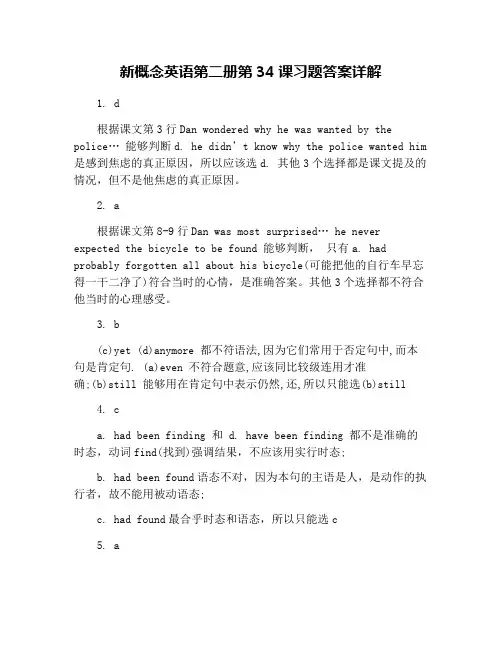
新概念英语第二册第34课习题答案详解1. d根据课文第3行Dan wondered why he was wanted by the police… 能够判断d. he didn’t know why the police wanted him 是感到焦虑的真正原因,所以应该选d. 其他3个选择都是课文提及的情况,但不是他焦虑的真正原因。
2. a根据课文第8-9行Dan was most surprised… he never expected the bicycle to be found 能够判断,只有a. had probably forgotten all about his bicycle(可能把他的自行车早忘得一干二净了)符合当时的心情,是准确答案。
其他3个选择都不符合他当时的心理感受。
3. b(c)yet (d)anymore 都不符语法,因为它们常用于否定句中,而本句是肯定句. (a)even 不符合题意,应该同比较级连用才准确;(b)still 能够用在肯定句中表示仍然,还,所以只能选(b)still4. ca. had been finding 和 d. have been finding 都不是准确的时态,动词find(找到)强调结果,不应该用实行时态;b. had been found语态不对,因为本句的主语是人,是动作的执行者,故不能用被动语态;c. had found最合乎时态和语态,所以只能选c5. a本句是对地点提问的疑问句,回答是In a small village,只有a. Where 是问地点的,所以a. 是准确答案,而其他3个选择都不是问地点的。
6. da. to 和b. to be 都不合乎语法,因为以that引导的是从句,应该有主语和谓语,而不应该是用to引导的动词不定式, c. they也不合乎语法,因为主句动词是过去式,从句也应该是过去时态. d. they would 是过去将来时,最合乎语法,所以只能选它.7. c本句有表示过去时间的状语twenty years ago(20年前),所以应该用一般过去时。
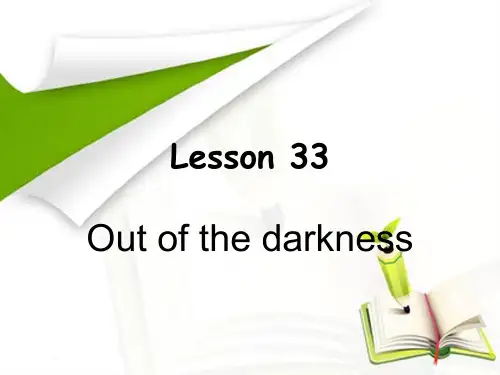
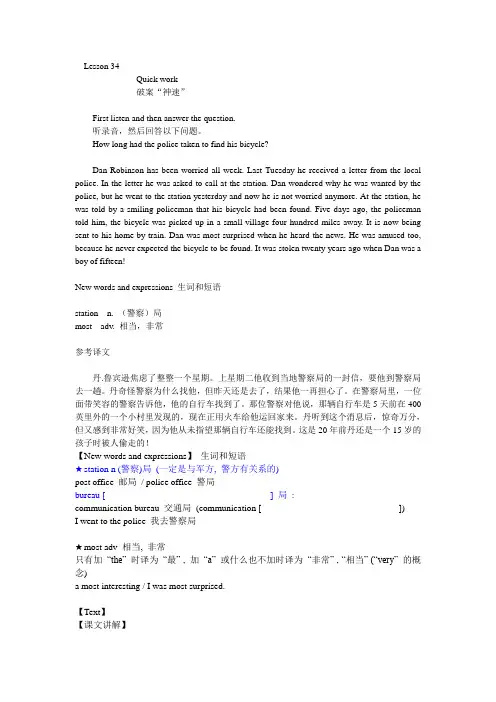
Lesson 34Quick work破案“神速”First listen and then answer the question.听录音,然后回答以下问题。
How long had the police taken to find his bicycle?Dan Robinson has been worried all week. Last Tuesday he received a letter from the local police. In the letter he was asked to call at the station. Dan wondered why he was wanted by the police, but he went to the station yesterday and now he is not worried anymore. At the station, he was told by a smiling policeman that his bicycle had been found. Five days ago, the policeman told him, the bicycle was picked up in a small village four hundred miles away. It is now being sent to his home by train. Dan was most surprised when he heard the news. He was amused too, because he never expected the bicycle to be found. It was stolen twenty years ago when Dan was a boy of fifteen!New words and expressions 生词和短语station n. (警察)局most adv. 相当,非常参考译文丹.鲁宾逊焦虑了整整一个星期。
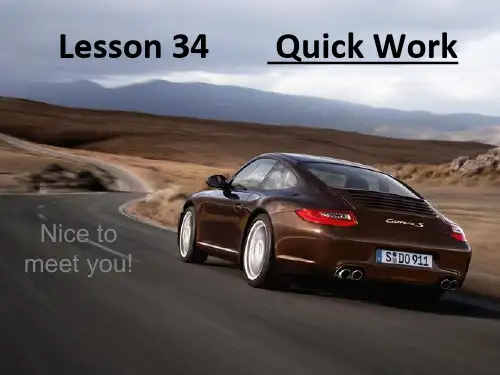
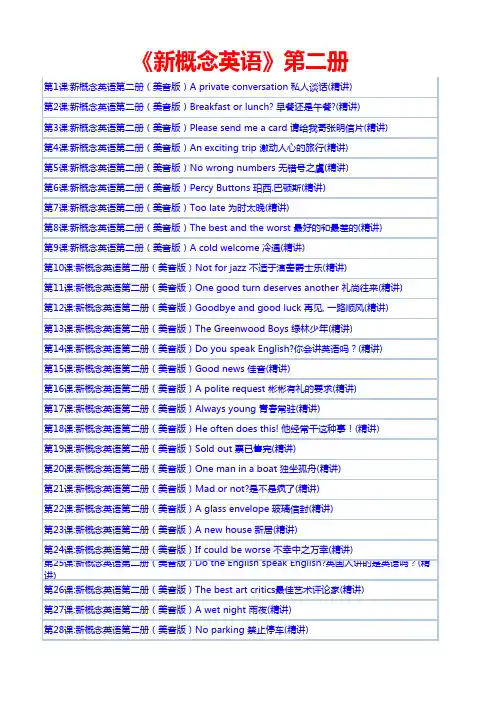
《新概念英语》第二册第1课:新概念英语第二册(美音版)A private conversation 私人谈话(精讲)第2课:新概念英语第二册(美音版)Breakfast or lunch? 早餐还是午餐?(精讲)第3课:新概念英语第二册(美音版)Please send me a card 请给我寄张明信片(精讲)第4课:新概念英语第二册(美音版)An exciting trip 激动人心的旅行(精讲)第5课:新概念英语第二册(美音版)No wrong numbers 无错号之虞(精讲)第6课:新概念英语第二册(美音版)Percy Buttons 珀西.巴顿斯(精讲)第7课:新概念英语第二册(美音版)Too late 为时太晚(精讲)第8课:新概念英语第二册(美音版)The best and the worst 最好的和最差的(精讲)第9课:新概念英语第二册(美音版)A cold welcome 冷遇(精讲)第10课:新概念英语第二册(美音版)Not for jazz 不适于演奏爵士乐(精讲)第11课:新概念英语第二册(美音版)One good turn deserves another 礼尚往来(精讲)第12课:新概念英语第二册(美音版)Goodbye and good luck 再见, 一路顺风(精讲)第13课:新概念英语第二册(美音版)The Greenwood Boys 绿林少年(精讲)第14课:新概念英语第二册(美音版)Do you speak English?你会讲英语吗?(精讲)第15课:新概念英语第二册(美音版)Good news 佳音(精讲)第16课:新概念英语第二册(美音版)A polite request 彬彬有礼的要求(精讲)第17课:新概念英语第二册(美音版)Always young 青春常驻(精讲)第18课:新概念英语第二册(美音版)He often does this! 他经常干这种事!(精讲)第19课:新概念英语第二册(美音版)Sold out 票已售完(精讲)第20课:新概念英语第二册(美音版)One man in a boat 独坐孤舟(精讲)第21课:新概念英语第二册(美音版)Mad or not?是不是疯了(精讲)第22课:新概念英语第二册(美音版)A glass envelope 玻璃信封(精讲)第23课:新概念英语第二册(美音版)A new house 新居(精讲)第24课:新概念英语第二册(美音版)If could be worse 不幸中之万幸(精讲)第25课:新概念英语第二册(美音版)Do the English speak English?英国人讲的是英语吗?(精讲)第26课:新概念英语第二册(美音版)The best art critics最佳艺术评论家(精讲)第27课:新概念英语第二册(美音版)A wet night 雨夜(精讲)第28课:新概念英语第二册(美音版)No parking 禁止停车(精讲)第29课:新概念英语第二册(美音版)Taxi! 出租汽车(精讲)第30课:新概念英语第二册(美音版)Football or polo? 足球还是水球?(精讲)第31课:新概念英语第二册(美音版)Success story 成功者的故事(精讲)第32课:新概念英语第二册(美音版)Shopping made easy 购物变得很方便(精讲)第33课:新概念英语第二册(美音版)Out of the darkness 冲出黑暗(精讲)第34课:新概念英语第二册(美音版)Quick work 破案 “神速”(精讲)第35课:新概念英语第二册(美音版)Stop thief!捉贼!(精讲)第36课:新概念英语第二册(美音版)Across the Channel 横渡海峡(精讲)第37课:新概念英语第二册(美音版)The Olympic Games 奥林匹克运动会(精讲)第38课:新概念英语第二册(美音版)Everything except the weather 唯独没有考虑到天气(精讲第39课:新概念英语第二册(美音版)Am I all right? 我是否痊愈?(精讲)第40课:新概念英语第二册(美音版)Food and talk 进餐与交谈(精讲)第41课:新概念英语第二册(美音版)Do you call that a hat? 你把那个叫帽子吗?(精讲)第42课:新概念英语第二册(美音版)Not very musical 并非很懂音乐(精讲)第43课:新概念英语第二册(美音版)Over the South Pole 飞越南极(精讲)第44课:新概念英语第二册(美音版)Through the forest 穿过森林(精讲)第45课:新概念英语第二册(美音版)A clear conscience 问心无愧(精讲)第46课:新概念英语第二册(美音版)Expensive and uncomfortable 既昂贵又受罪(精讲)第47课:新概念英语第二册(美音版)A thirsty ghost 嗜酒的鬼魂(精讲)第48课:新概念英语第二册(美音版)Did you want to tell me something? 你想对我说什么吗?第49课:新概念英语第二册(美音版)The end of a dream 美梦告终(精讲)第50课:新概念英语第二册(美音版)Taken for a ride 乘车兜风(精讲)第51课:新概念英语第二册(美音版)Reward for virtue 对美德的奖赏(精讲)第52课:新概念英语第二册(美音版)A pretty carpet 漂亮的地毯(精讲)第53课:新概念英语第二册(美音版)Hot snake 触电的蛇(精讲)第54课:新概念英语第二册(美音版)Sticky fingers 粘糊的手指(精讲)第55课:新概念英语第二册(美音版)Not a gold mine 并非金矿(精讲)第56课:新概念英语第二册(美音版)Faster than sound! 比声音还快!(讲解)第57课:新概念英语第二册(美音版)Can I help you, madam? 您要买什么,夫人?(精讲)第58课:新概念英语第二册(美音版)A blessing in disguise? 是因祸得福吗?(精讲)第59课:新概念英语第二册(美音版)In or out? 进来还是出去?(精讲)第60课:新概念英语第二册(美音版)The future 卜算未来(精讲)第61课:新概念英语第二册(美音版)Trouble with the Hubble 哈勃望远镜的困境(讲解)第62课:新概念英语第二册(美音版)After the fire 大火之后(精讲)第63课:新概念英语第二册(美音版)She was not amused 她并不觉得好笑(精讲)第64课:新概念英语第二册(美音版)The Channel Tunnel 海峡隧道(精讲)第65课:新概念英语第二册(美音版)Jumbo versus the police 小象对警察(精讲)第66课:新概念英语第二册(美音版)Sweet as honey! 像蜜一样甜!(精讲)第67课:新概念英语第二册(美音版)Volcanoes 火山(精讲)第68课:新概念英语第二册(美音版)Persistent 纠缠不休(精讲)第69课:新概念英语第二册(美音版)But not murder!并非谋杀!(精讲)第70课:新概念英语第二册(美音版)Red for danger 危险的红色(精讲)第71课:新概念英语第二册(美音版)A famous clock第72课:新概念英语第二册(美音版)A car called bluebird第73课:新概念英语第二册(美音版)The record-holder第74课:新概念英语第二册(美音版)Out of the limelight第75课:新概念英语第二册(美音版)SOS第76课:新概念英语第二册(美音版)April Fools Day第77课:新概念英语第二册(美音版)A successful operation第78课:新概念英语第二册(美音版)The last one?第79课:新概念英语第二册(美音版)By air第80课:新概念英语第二册(美音版)The Crystal Palace第81课:新概念英语第二册(美音版)Escape第82课:新概念英语第二册(美音版)Monster or fish?第83课:新概念英语第二册(美音版)After the elections第84课:新概念英语第二册(美音版)On strike第85课:新概念英语第二册(美音版)Never too old to learn第86课:新概念英语第二册(美音版)Out of control第87课:新概念英语第二册(美音版)A perfect alibi第88课:新概念英语第二册(美音版)Trapped in a mine第89课:新概念英语第二册(美音版)A slip of the tongue 第90课:新概念英语第二册(美音版)What第91课:新概念英语第二册(美音版)Three men in a basket 第92课:新概念英语第二册(美音版)Asking for trouble第93课:新概念英语第二册(美音版)A noble gift第94课:新概念英语第二册(美音版)Future champions第95课:新概念英语第二册(美音版)A fantasy第96课:新概念英语第二册(美音版)The dead return。
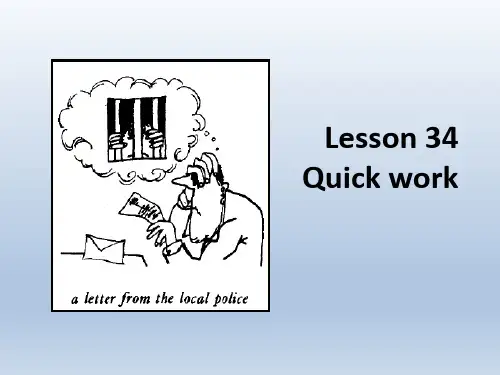

Lesson 34Quick work破案“神速”First listen and then answer the question.听录音,然后回答以下问题。
How long had the police taken to find his bicycle?Dan Robinson has been worried all week. Last Tuesday he received a letter from the local police. In the letter he was asked to call at the station. Dan wondered why he was wanted by the police, but he went to the station yesterday and now he is not worried anymore. At the station, he was told by a smiling policeman that his bicycle had been found. Five days ago, the policeman told him, the bicycle was picked up in a small village four hundred miles away. It is now being sent to his home by train. Dan was most surprised when he heard the news. He was amused too, because he never expected the bicycle to be found. It was stolen twenty years ago when Dan was a boy of fifteen!New words and expressions 生词和短语station n. (警察)局most adv. 相当,非常参考译文丹.鲁宾逊焦虑了整整一个星期。
Lesson 33 单词讲解1.darkness n. 黑暗the long hours of darkness during winterHe stared out the window at the gathering darknessThe lamp suddenly went out, leaving us in darkness.The room was in total/complete darkness.dark [ADJ] 黑暗的,深色的;模糊的the dark winter daysSuddenly, the room went darkmen in dark suitsa dark blue dress-ness:happiness、nervousness、carelessness2.explain [V] 解释,叙述;说明...的原因Let me explain what I meanHe explained that it had been a difficult film to make.She explained that she had been ill.I explained the situation to my bank manager.Wait! I can explain everything.How can you explain that sort of behaviour?Explain yourself!I’m going to give you five seconds to explain yourself.explanation [N] 说明,解释Can you think of any explanation for this failure?The concert was cancelled without explanation.I’ll try and give you a quick explanation of how the machine works.The police gave no explanation for their actionsThis theory may provide an explanation for the origins of the universe.When I asked for an explanation, the people at the office said they didn’t know.I think you owe me some kind of explanation.3.storm [N] 暴风雨;大动荡rain stormsnow stormsand stormbrain storma storm in a teacupTwenty people were killed when storms struck the Midwest.The governor found himself at the center of a political storm .The new show took London by storm.typhoon n. [气象] 台风tornado n. [气象] 龙卷风;4.towards [PREP] 向,朝;接近towards eveningwalk towards the doorThe ball flew towards me.5.ahead [ADV] 在前面地;领先地;将来,今后go aheadHenry hurried on aheadHe stared straight ahead .There were four people ahead of me at the doctor’s.Problems may lie aheadYou have a long trip ahead of youI cook rice two or three hours aheadCan you tell me ahead of time if you’re coming?Lesson 33 课文&语法讲解Key Points: 介词介词接:名词、代词、动名词、从句Out of the darknessNearly a week passed before the girl was able to explain what had happened to her. One afternoon shea storm in a teacupset out from the coast in a small boat and was caught in a storm. Towards evening, the boat struck a rock and the girl jumped into the sea. Then she swam to the shore after spending the whole night in the water. During that time she covered a distance of eight miles. Early next morning, she saw a light ahead. She knew she was near the shore because the light was high up on the cliffs. On arriving at the shore, the girl struggled up the cliff towards the light she had seen. That was all she remembered. When she woke up a day later, she found herself in hospital.1.Nearly a week passed before the girl was able to explain what had happened to her.pass [V] 经过 A week passed.I pass the sports centre on the way to work.past [PREP] 经过 It is eleven past ten.[N] 过去 We cannot change the past.[ADJ] 过去的 The past experiences brought me here.2.One afternoon she set out from the coast in a small boat and was caught in a storm.from [PREP] 从哪里来set out = set off(set)be caught in: 陷入......,困在......I was caught in the traffic jam yesterday.3.Towards evening, the boat struck a rock and the girl jumped into the sea.towards [PREP] 朝,向;对于;有助于(与to相比,强调动作的过程)into [PREP] 到…里;深入…之中(与in相比,强调动作的过程)strike -- struck -- struck4.Then she swam to the shore after spending the whole night in the water.swim -- swam -- swumDuring that time she covered a distance of eight miles.5.Early next morning, she saw a light ahead. She knew she was near the shore because the lightwas high up on the cliffs.Know -- knew --known6.On arriving at the shore, the girl struggled up the cliff towards the light she had seen.on arrivingstruggle upthe light (that/which)she had seen修饰名词的从句只有定语从句和同位语从句如果发现引导词被省略,那么该从句是定语从句。
定语从句中,当引导词在从句中做宾语时可以被省略。
7.That was all she remembered. When she woke up a day later, she found herself in hospital.That was all(that)she rememberedall在此是代词,代替了名词。
所以后面从句为定语从句。
一般由代词为先行词的定语从句中,引导词要用that,而不能是which。
表示地点和方向的介词PREP1.set out from the coastfrom 来自,从;由于;今后How do you get from here to Shanghai?(从......)We live about five miles from Boston.(离......)He was standing only a few feet away from me.He’ll be here tomorrow from about seven o’clock onwards.(从......时候开始)From now on, I will only be working in the mornings.Prices range from £10,000 to over £100,000. (表示范围)2.swam to the shoreto 向,朝,到,往the road to Londonour weekly trip to the supermarketsending a spaceship to MarsHe sent presents to the children.(给......)She whispered something to the girl beside her.Give my best wishes to your parents when you see them.fly to Beijing/fly for Beijing3.towards the light she had seentowards 朝, 向(美式toward) 与to相比,注重动作的过程walk towards the entrancelook out towards the seaSally turned her back towards Kim.He noticed two policemen coming towards him.He was standing with his back towards me.4.jumped into the seeinto 到…里;深入…之中Come into the office.There must be another way into the cave.I’ve got to go into town this morning.5.其他arriving at the shoreon the cliffin a small boat / in a stormin hospital or at hospitalarrive in + 某一个大地点的里面(由不同部分组成的Country, State/Province, City, County/ District, Town)arrive at + 某一个小地点(可以视为整体的地点Village, Station, Airport, School, Hotel, Hospital. etc) arrive on + the scene(现场)6.练习:Don't throw the rubbish the window.Please come the classroom and join us.He is in Shanghai, and he will fly Shanghai Beijing.She hopes that she will stand the top of the highest mountain some day.It is impolite to point people.I put the laptop your bag.Lesson 34 单词讲解1.local [N] 局部;当地居民local hospitalWe asked one of the locals to recommend a restaurant.We'd better check on the game in the local paper.2.station [N] (警察)局a police stationa fire station 消防站a train stationa bus station3.most [ADV] 相当, 非常It’s a most funny story.It’s most kind of you to meet me at the airport.The most important thing is to stay calm.I guess the food I eat most is pasta.Most of all, I just felt sad that it was over.Thank you for a most interesting evening.Lesson 34 课文&语法讲解被动语态的时态一般时态进行时态完成时态现在AmIs + givenAre AmIs + being + givenAreHas+ been + givenHave过去Was+ givenWere Was+ being + givenWereHad been given将来Will(shall) + be given Will have been given过去将来Would(should) + be given Would have been givenquick workDan Robinson has been worried all week. Last Tuesday he received a letter from the local police. In the letter he was asked to call at the station. Dan wondered why he was wanted by the police, but he went to the station yesterday and now he is not worried anymore. At the station, he was told by a smiling policeman that his bicycle had been found. Five days ago, the policeman told him, the bicycle was pickedup in a small village four hundred miles away. It is now being sent to his home by train. Dan was most surprised when he heard the news . He was amused too, because he never expected the bicycle to be found. It was stolen twenty years ago when Dan was a boy of fifteen!1.Dan Robinson has been worried all week. Last Tuesday he received a letter from the local police.2.In the letter he was asked to call at the station.call at + 人call on + 地点visit + 人或地点3.Dan wondered why he was wanted by the police, but he went to the station yesterday and nowhe is not worried anymore.wanted 作agj是通缉令的意思not......anymore:再也不......4.At the station, he was told by a smiling policeman that his bicycle had been found.一般过去时和过去完成时连用,常常表示两件事之间有时间先后5.Five days ago, the policeman told him, the bicycle was picked up in a small village four hundredmiles away.pick up:捡到Pick-up:皮卡车6.It is now being sent to his home by train. Dan was most surprised when he heard the news .be surprised:被动语态演变为形容词7.He was amused too, because he never expected the bicycle to be found. It was stolen twentyyears ago when Dan was a boy of fifteen!。